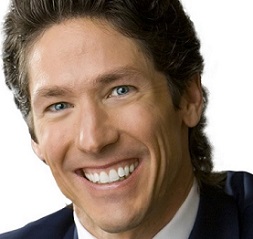
Seems to be a hey day for atheism, and anti-Christian faith. In fact, against anything old-time, or pro-family -- or so much as even seeming to be traditional. It is labelled primitive, or unscientific.

Critics have tried to pull him down, vilify him. But instead of destroying him, the attacks have left him undeterred. He just presses forward, ministering to the seekers. In fact, in some ways the campaigns of calumny have backfired. Osteen has come out all the stronger.
Hatred against Christians, or more specifically, "Anti-Catholicism" --- is the last acceptable prejudice.
My impression is that a lot of the defamation of evangelists like Joel Osteen is symptomatic of something broader, a general viciousness directed at Christianity (or perhaps faith of any kind) itself.
William Barrett wrote that "The central fact of modern history in the West -- by which we mean the long period from the end of the Middle Ages to the present -- is unquestionably the decline of religion." See we need our values yet.
For all the accomplishments of modern man, and they are many, he simply has no patience with the primitive, or with superstition, stories, narratives and myths. He has exalted reason because he rejects the underdeveloped, the archaic. Tribalism and mythology are old-fashioned. Indigenous culture reeks of INFERIORITY, as Darwin taught.
Just name some of the reasons, however much justified, that are thrown at people of faith, and that includes Christians in general.
Just to name a handful.
And then there is the Mariolatry gynealotry accusation (which Protestants threw at Roman Catholics)
A great many people find comfort and help by honoring their heritage. Many of us find benefit in clinging to faith and tradition, and in cherishing the best of the past. Our ancestors were not perfect, just as we are imperfect ourselves. But faith has an answer for that. Jesus said he called the sinners, not the righteous. He said God is a physician for the infirm, the sick -- not for the perfected healthy ones. (Or those too proud to humble themselves and learn something.).Our ancestors in northern Europe were roving tribes before the Romans came. They had no "nation" as we know it. They had neither writing nor laws. But they had a code of morality, nonetheless. It was primitive to be sure, but it got them by. They plundered other tribes, spoiled them of their goods (and women), then moved on. They were nomadic. In a sense they were "free" as Nietzsche called them. "Franks."
But the hunter-gatherer subsistence was extremely precarious. Winters were very rough, especially for the very young and the very old.
At first the Enlightenment lashed out at the Church, and indeed all authority. They idealized some idyllic "State of Nature." But Thomas Hobbes debunked this ROMANTIC myth... saying that those barbarians, without government or commerce, were actually far worse off than our "slavery" under Christianity, and kings and government.
In such condition there is no place for industry, because the fruit thereof is uncertain, and consequently, not culture of the earth, no navigation, nor the use of commodities that may be imported by sea, no commodious building, no instruments of moving and removing such things as require much force, no knowledge of the face of the earth, no account of time, no arts, no letters, no society, and which is worst of all, continual fear and danger of violent death, and the life of man, solitary, poor, nasty, brutish, and short.The Roman "tyrants" brought their law and order. They brought Christianity. They brought agriculture, and made those barbarian hunter-gatherers actually learn to WORK. (Agriculture.) Was it a willing conversion? No, certainly not. At least at first.Here's a question. When you were young, did you WANT to go to school? Did you WANT to learn to do your homework. And do your chores. And listen to mother and dad? I'll bet not always.
The many other charges just seem never to end, but the church has always sought to grow. It is not frozen in time, even though the ancient sources of scripture, etc. Do not change. See the biblical bedrockThe church has always been a living, organic, dynamic entity. We are many members of one body. Just as Jewish people say, Am Yisroel Chai (the people of Israel LIVE) even so the Church also continues to live. It responds. It reacts. Is that such a scandal? It should not be. See Our Living Church
Vatican II presented the face of a Church unafraid of pluralism and diversity. Many of the documents coming out of the Second Vatican Council were thoroughly American Catholic in flavor, and all but embraced the American vision of Freedom of Conscience., which Judge Noonan calls, "our shining contribution" to the world --- the LUSTRE of America. (Amendment One).
No one denies the tendency of Catholicism to "circle the wagons" as far as the issue of unlimited toleration, latitudinarianism, and "licence." Often the attitude has been "extra ecclesiam nulla salus." Outside the Church there is no salvation. The official Catholic attitude used to be ERROR HAS NO RIGHTS, which often was a mere cover, or excuse, to persecute. That attitude put them on a collision course with the American vision of diversity and confidence in the people themselves.
I do not think Christianity will ever give up the principle of moral authority or the opposition to sin. Even with a more compassionate and affirming embrace of the sinners, the church simply cannot make excuses for sin itself. Even psychology has come to recognize the role of guilt. Willard Gaylin calls guilt the guardian of our goodness. If anything goes, then what are we saying? Do anything you want? Dr. King ultimately insisted on a world of moral absolutes. He was more comfortable with a realism that confronts the issues of sin and cruelty and injustice. We do not live in a perfect world. Men are not angels. And by rejecting naivete, and taking a stand against immorality, It does not make us "mean" old-fashioned and moralistic, but simply faithful to common sense
Why can't Christians find a middle ground? Why can't we come up with a balance between liberalism and tradition, or biblical morality? Some of us are trying. See Ruben Diaz
In many ways it really does seem that the West has departed from the old paths. William Barrett said that, "The central fact of modern history in the West -- by which we mean the long period from the end of the Middle Ages to the present -- is unquestionably the decline of religion."
Jeremiah 6:16
Dostoyevsky said, "If God does not exist, everything is permitted."The Bible says, Stand ye in the ways, and see, and ask for the old paths, where is the good way, and walk therein, and ye shall find rest for your souls.
See
America's Faith Landscape -- and Nativist anti-Papism
Prayer for more bipartisanship and a spirit of reconciliation
|
I want to say to you, about myself, that I am a child of this age, a child of unfaith and skepticism, and probably (indeed I know it) shall remain so to the end of my life. How dreadfully has it tormented me (and torments me even now) this longing for faith, which is all the stronger for the proofs I have against it. And yet God gives me sometimes moments of perfect peace; in such moments I love and believe that I am loved; in such moments I have formulated my creed, wherein all is clear and holy to me. This creed is extremely simple; here it is: I believe that there is nothing lovelier, deeper, more sympathetic, more rational, more manly, and more perfect than the Saviour; I say to myself with jealous love that not only is there no one else like Him, but that there could be no one. I would even say more: If anyone could prove to me that Christ is outside the truth, and if the truth really did exclude Christ, I should prefer to stay with Christ and not with truth.
|
Where sin did abound ~ Grace did even more abound
Here are some sites I hope you find sympathetic :
- Toward a more human and Jewish Jesus (was he spanked as a boy)
- Common Ground between Jews and Christians - moral issues (politically)
- Blame Game: "I turned out bad because ..." (Mother or Teacher etc)
- Joseph of Nazareth: Patron Saint of Teens and the Parents of Teens
- Redeeming women's traditional role as Mothers (not just for conservatives)
- "Almost Mystics" - Some of us have been deeply helped by our Christian faith.
- America cannot afford to be materially rich and spiritually poor (President Kennedy)

Visit the following (eingedi) Pages at Eingedi:
Joseph of Nazareth | Founts of Wisdom | Pure San Antonio | Vineyards of Eingedi | Poisoned Waters | Really Bad Stuff

In the Name of the Father, and the Son, and the Holy Spirit
AMEN
________
Page
by
Robert Shepherd
|
Jaroslav Pelikan writes
The most influential book to be produced in the Renaissance was not, as some might suppose, Machiavelli's Prince, but the first published edition of the Greek New Testament, the Novuum Instrumentum omne, produced by Erasmus in 1516, which made the original text available to many for the first time. This edition and its successors became the basis for literally thousands of new translations of the Gospels into most of the languages of the world, and contrary to Erasmus' intentions, it also helped set off the Reformation. See Textus Receptus. |